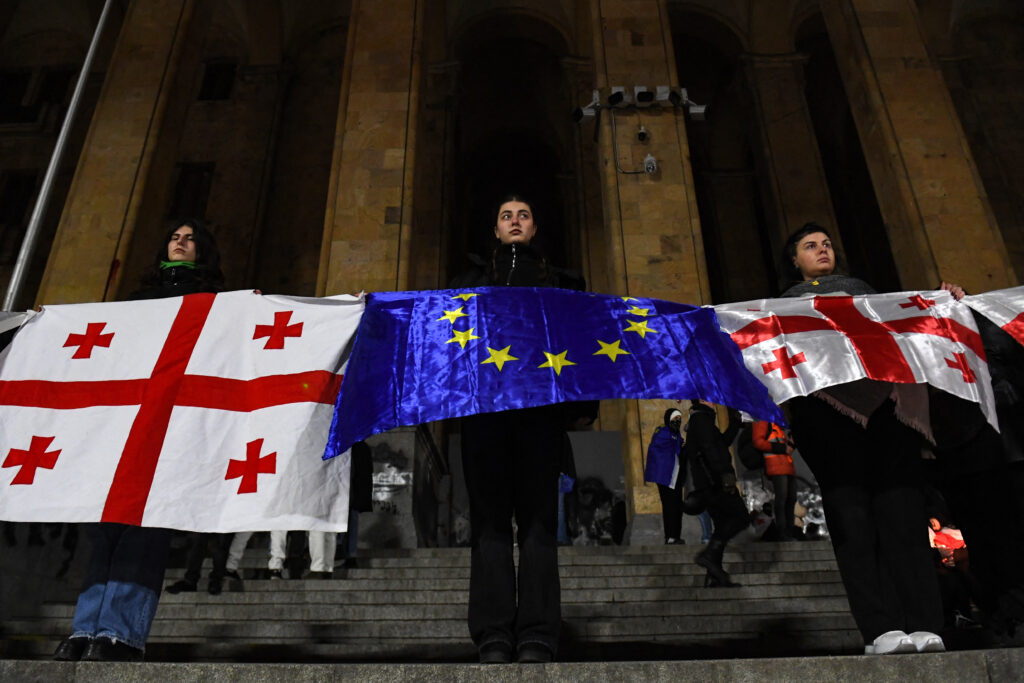Brussels – Instead of decreasing, tensions in Georgia are progressively rising every day, and there are no signs of a peaceful resolution. As the street protests enter their eighth consecutive day, violence is growing both from protesters and, more importantly, by the security apparatus that is continuing to respond disproportionately with government cover. The most egregious incident was the physical assault on one of the parliamentary opposition leaders, Nika Gvaramia, who was later arrested and taken away by police in an unconscious state. The National Civic Ombudsman called the behavior of law enforcement officials “baffling” and has compared the treatment of detainees to acts of torture.
The assault on Nika Gvaramia
During yesterday’s (Dec. 4) demonstrations in the capital, police physically assaulted Nika Gvaramia, one of the leaders of Coalition for Change (CFC), an electoral alliance bringing together several opposition parties that appeared united at the polls last Oct. 26 against Georgian Dream (the ruling party in power since 2012). According to the footage, police threw him violently to the ground and then proceeded with what seemed to be a beating.
In the dramatic images available online, Gvaramia is seen engaged in a heated discussion with law enforcement officials, probably complaining about raids on opposition party premises, until the verbal altercation degenerates into an attack on him. The 48-year-old leader of Ahali (new in Georgian), a liberal party that merged into the CFC last July, is manhandled by policemen, who grab and throw him onto a sidewalk and are then captured on camera repeatedly kicking and punching him. Other footage depicts law enforcement officers bringing a seemingly unconscious Gvaramia to a car and driving away with him on board after placing him under arrest.
Footage – @NikaGvaramia212, one of our Coalition leaders, was dragged by the police and thrown into a detention car after getting physically assaulted and falling unconscious.
He verbally insisted to be allowed into the search of our members parties’ office, as he’s a lawyer. pic.twitter.com/U5yTCGZqPo— Coalition 4 Change (@CoalitionGEO) Dec. 4, 2024
This is certainly not the first arrest in this latest, tense phase of the anti-government protests that have been shaking the Caucasian nation for more than a month – arrests have already reached 300 – nor is it an isolated instance of violence and disproportionate use of force by the Georgian security apparatus. Among those arrested in recent hours is another opposition leader, Aleko Elisashvili, along with at least six other politicians belonging to parties critical of the government. Also, one of the Dafioni Youth Protest Movement leaders reportedly has been detained.
Mistreatment of prisoners
Georgian Civic Ombudsman Levan Ioseliani declared to have visited at least 260 protesters in detention centers and medical clinics, pointing out that “188 of them indicate ill-treatment by police” and that “the methods used by law enforcement when arresting citizens are disturbing.”
“An alarming number of detainees indicate beatings and ill-treatment,” he explained, adding that “most of them have serious injuries to the face, eyes, and head, which practically excludes the probability that the police each time used the necessary, proportionate force against them.” The evidence, he concludes, leads one to believe ” the police are using violent methods against citizens for the purpose of punishment” and notes that “intentional, severe violence for the purpose of punishment constitutes an act of torture.”
High-tension Protests
For days, protests sparked by the decision of the government to suspend EU accession negotiations until 2028 have been suppressed by police riot units with rubber bullets, stun grenades, and water cannons. According to the Interior Ministry, at least seven people were arrested on charges of leading organized violence, a crime punishable by up to nine years in prison. During searches of private residences, police found air rifles, fireworks (which protesters employ against police in response to water cannons and grenades in urban guerrilla warfare), and Molotov cocktails.

Georgian authorities accused protesters of planning to subvert law and order, intending to stage a coup along the lines of the Ukrainian Euromaidan protests, which bloodied Kyiv between November 2013 and February 2014 and led to the ouster of pro-Russian President Viktor Yanukovych and, subsequently, Moscow’s unilateral annexation of Crimea and the start of the war in the Donbas.
Law enforcement acts continue to be covered by government complacency: “I wouldn’t call it repression; it’s more like prevention,” said Premier Irakli Kobakhidze, who complimented the police’s handling of the protests. The prime minister suggested, without providing evidence, that it is the opposition parties–who are boycotting the new Parliament by refusing to take part in the work of the House–that are supplying the protesters with “pyrotechnics and other means” with which to attack the police.
English version by the Translation Service of Withub







